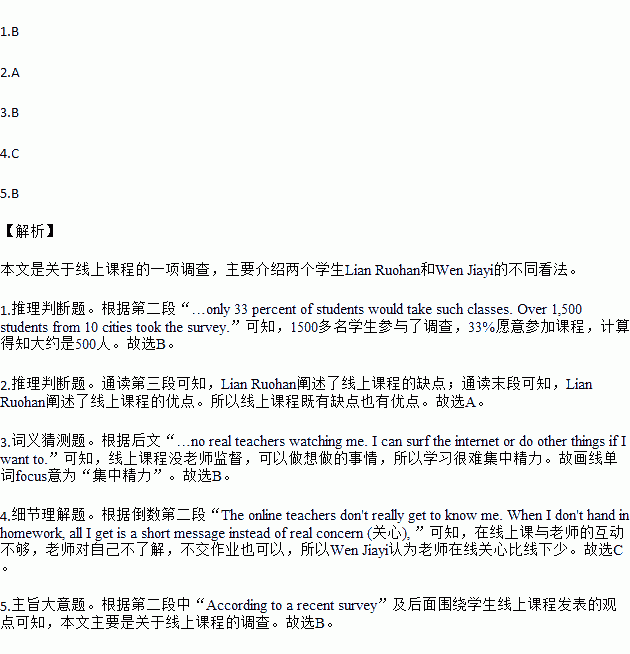题目内容
Do you have any online classes? It is possible to take classes at home. All you need is a computer and a headset.
However, most students don't seem to like online classes. According to a recent survey, only 33 percent of students would take such classes. Over 1,500 students from 10 cities took the survey.
Many students said it is hard to focus on studying while taking online classes. This was true for Lian Ruohan, 15, at the Affiliated High School of Peking University. “There are no classmates, no real teachers watching me. I can surf the internet or do other things if I want to. It's harder to always stay focused," she said.
Lian prepares a lot before taking her classes to make sure she will pay attention. She also pushes herself to communicate with teachers. Students can come up with or answer questions while taking online classes.
But Wen Jiayi, 14, at the Yucai Middle School Attached to Chengdu No 7 High School, thinks online interaction (互动)isn't enough.“The online teachers don't really get to know me. When I don't hand in homework, all I get is a short message instead of real concern (关心),” she said.
However, online classes still have other advantages.“It saves time and money compared to taking offline classes. Also, if I don't understand some parts of a lesson, I can watch it over again," Lian said.
1.How many students would take online classes according the survey?
A.About 400. B.About 500. C.About 600. D.About 700.
2.Which of the following is Lian Ruohan’s opinion on online classes?
A.There are both advantages and disadvantages.
B.The advantages are more than disadvantages.
C.She can learn more through online classes.
D.Online interaction isn't enough.
3.The underlined word “ focus” means________in Chinese.
A.走神儿 B.集中精力 C.理解 D.厌烦
4.What’s Wen Jiayi’s problem in taking online classes?
A.She can’t follow the teachers.
B.The teachers can’t answer her problems.
C.The teachers online care less than offline.
D.She can’t finish her homework in time.
5.What’s this passage about?
A.The writer’s view on online classes.
B.A survey about online classes.
C.The future development of online classes.
D.How to take online classes.
Family Rules | 1. Got up at 6:00 am and go to bed by 10:00 pm. 2. Don’ t talk loudly in the room. 3. Clean your bedroom every day. 4. Wash your skirts and T—shirts 5. Don’t meet friends before you finish your homework. |
________ Rules | 1. Come into the room with clean shoes. 2. Don’t eat or drink in the room. 3. Don’t talk loudly in the room. 4. Turn on the computers and turn off them after class. |
1.The word(s) in the blank(空格) can be_____
A.Computer room B.Library C.Classroom D.Supermarket
2.The word“ turn off” means_____ in Chinese.
A.打开 B.搬走 C.冲洗 D.关闭
3.According to(根据) the passage, we know_____.
A.you can’t talk loudly in both of the two kinds of rules.
B.you may come into the room with skirts and T—skirts.
C.you can go to bed after 10:00 pm.
D.you cannot meet friends.

